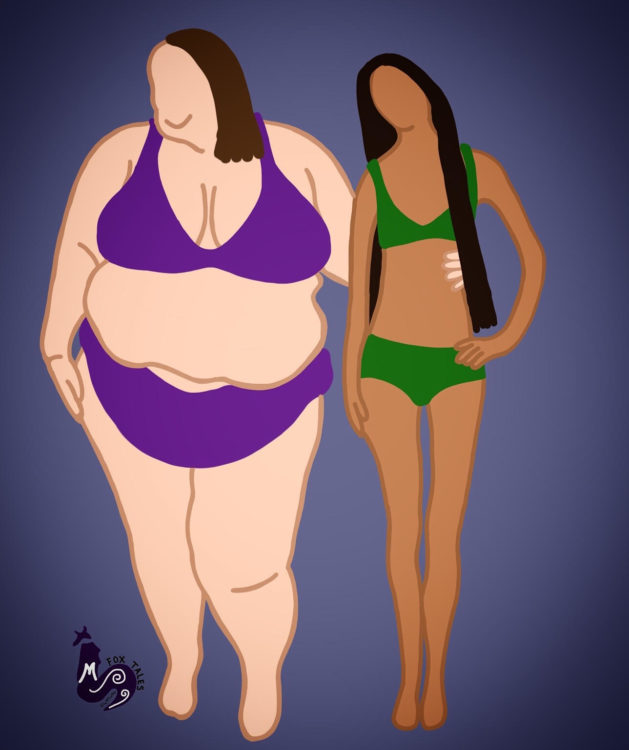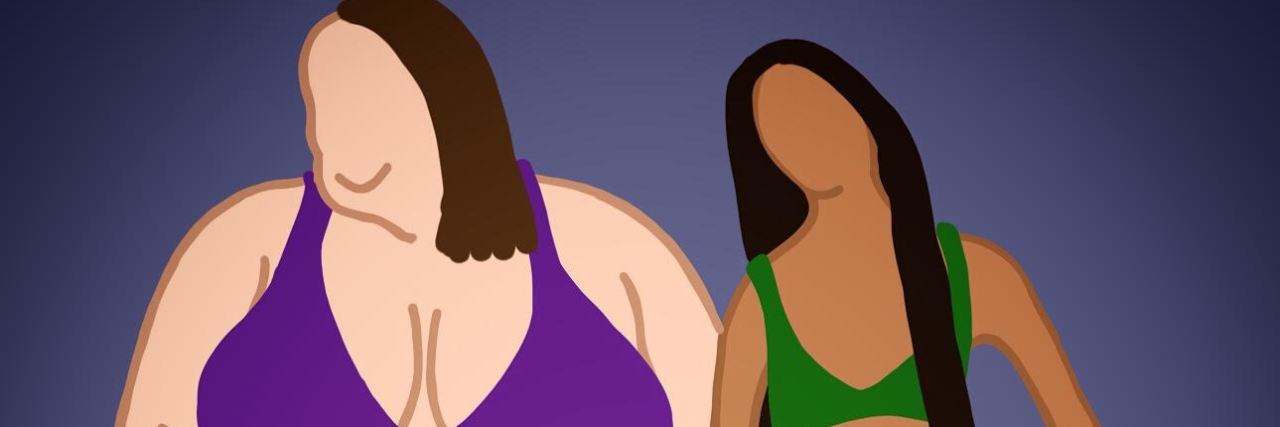Why Eating Disorders Shouldn’t Be Diagnosed by Size
Editor's Note
If you live with an eating disorder, the following post could be potentially triggering. You can contact the Crisis Text Line by texting “NEDA” to 741741.
Content Warning: explicit eating disorder symptoms and weight-related discussion.
Eating disorders are not “diets.” They are not a phase. They are not vanity. An eating disorder is a psychiatric illness. It has the highest mortality rate of any other mental illness.
Did you know that the only thing you can tell about a person by looking at their size, is their size? Weight does not determine health. There are many health risks that can be exacerbated when a body is under or over a certain weight. You don’t know what that certain weight is for each person. Due to media stereotypes and the false representation of eating disorders as an emaciated young white girl, hundreds of thousands of people do not seek treatment.
One of these women has an eating disorder. The other does not. One of these women is severely malnourished:*

She goes days without eating, and then her body functions slow down in order to conserve energy. Her brain turns off all logic because if she does not eat, she will die. So food becomes a means of survival. Because she has an eating disorder, her fear of food makes her start slowly and then that part of her brain takes over. She eats all the food she can find in her house until she is over-full. The shame of having eaten more than “normal” becomes overbearing and that mean inner critic voice in her head says terrible things. So she ends up purging, getting rid of everything she just put into herself. Her “normal” amount of food may be a “binge” in her mind.
When you have an eating disorder, all sense of “normality” is warped. Now she is feeling shame that she ate, shame that she threw up. She thinks that she doesn’t deserve to nourish herself. She is not worthy of food because of her size. Her blood tests are constantly a concern. She is extremely malnourished and deficient in almost every vitamin and mineral the doctors are testing for. The doctor is confused about the results, and it doesn’t occur to them that it could be an eating disorder because of her size.
One of these women is praised for her size. Another is shamed for hers. Neither will seek treatment because the one who is praised “can’t be sick,” otherwise why would she get so much positive attention about her body. Another one “can’t be sick” because that’s not what a malnourished person “looks like.”
One of these women has become so sick that she is now purging everyday. She sneaks to the bathroom at work after her snack of yogurt and blueberries, and throws it up. She does the same thing after her salad at lunch time. She doesn’t bother eating dinner if no one is around to notice.
Eating disorders are mental illnesses in which there are no medications that will change your brain. Treatment requires physical, emotional and mental intervention. Changing long-ingrained thought patterns and growing new neuropathways is just as important as stopping the cycle of symptoms.
One of these women is really sick. One of these women is slowly killing herself. You can’t tell who has an eating disorder by looking at them. Everyone has a story that you don’t know. Your job is to refrain from judgment of other people’s bodies. And of other people’s lives. Refrain from commenting on bodies. Whether it is praise or shame, you don’t know what affect you will have with your words — even when those words are well-intended.
One of these women has an eating disorder. And without help, she is going to die.
If you or someone you know are struggling with an eating disorder, please seek support. Here are a few websites that can help you find what you need:
USA: https://www.nationaleatingdisorders.org/
Canada: http://www.nedic.ca/
Toronto: https://sheenasplace.org/
*Story image property of Fox Tales Art.
Follow this journey on the author’s blog.

